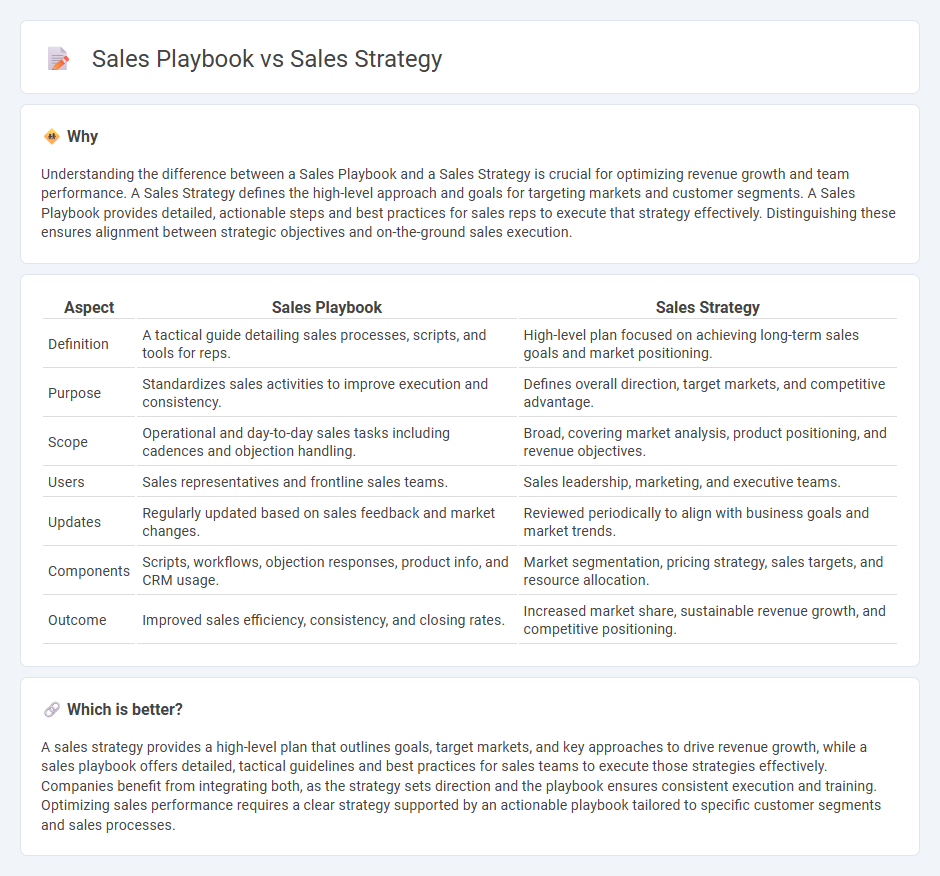
A Sales playbook outlines specific tactics, scripts, and processes that sales teams use to engage prospects and close deals effectively. In contrast, a Sales strategy defines the overall plan, goals, and market positioning to drive revenue growth and competitive advantage. Explore how integrating a well-crafted sales playbook with a solid strategy can maximize your sales success.
Why it is important
Understanding the difference between a Sales Playbook and a Sales Strategy is crucial for optimizing revenue growth and team performance. A Sales Strategy defines the high-level approach and goals for targeting markets and customer segments. A Sales Playbook provides detailed, actionable steps and best practices for sales reps to execute that strategy effectively. Distinguishing these ensures alignment between strategic objectives and on-the-ground sales execution.
Comparison Table
| Aspect | Sales Playbook | Sales Strategy |
|---|---|---|
| Definition | A tactical guide detailing sales processes, scripts, and tools for reps. | High-level plan focused on achieving long-term sales goals and market positioning. |
| Purpose | Standardizes sales activities to improve execution and consistency. | Defines overall direction, target markets, and competitive advantage. |
| Scope | Operational and day-to-day sales tasks including cadences and objection handling. | Broad, covering market analysis, product positioning, and revenue objectives. |
| Users | Sales representatives and frontline sales teams. | Sales leadership, marketing, and executive teams. |
| Updates | Regularly updated based on sales feedback and market changes. | Reviewed periodically to align with business goals and market trends. |
| Components | Scripts, workflows, objection responses, product info, and CRM usage. | Market segmentation, pricing strategy, sales targets, and resource allocation. |
| Outcome | Improved sales efficiency, consistency, and closing rates. | Increased market share, sustainable revenue growth, and competitive positioning. |
Which is better?
A sales strategy provides a high-level plan that outlines goals, target markets, and key approaches to drive revenue growth, while a sales playbook offers detailed, tactical guidelines and best practices for sales teams to execute those strategies effectively. Companies benefit from integrating both, as the strategy sets direction and the playbook ensures consistent execution and training. Optimizing sales performance requires a clear strategy supported by an actionable playbook tailored to specific customer segments and sales processes.
Connection
A sales playbook provides a detailed framework outlining best practices, processes, and techniques aligned with the overall sales strategy to achieve revenue goals. The sales strategy sets the direction and objectives based on market analysis and customer insights, while the playbook operationalizes this strategy through actionable steps and standardized workflows. Together, they ensure consistency, scalability, and effectiveness in closing deals and driving business growth.
Key Terms
Sales Strategy:
Sales strategy outlines the high-level plan to achieve sales targets, encompassing market analysis, customer segmentation, and competitive positioning to drive revenue growth. It defines sales goals, value propositions, and resource allocation to maximize sales team performance and market penetration. Explore detailed tactics and execution frameworks to boost your sales outcomes further.
Target Market
A sales strategy defines the overall approach to reach and engage the target market, outlining customer segments, value propositions, and competitive positioning. A sales playbook provides specific, actionable tactics and messaging tailored to different buyer personas within that target market to ensure consistent execution by the sales team. Explore how aligning your sales strategy and playbook can maximize impact on your ideal customers.
Value Proposition
A sales strategy defines the overarching plan to achieve revenue goals by identifying target markets and positioning the value proposition to meet customer needs effectively. In contrast, a sales playbook provides detailed tactics, scripts, and processes that help sales teams consistently communicate the value proposition during customer interactions. Explore how aligning your sales strategy with a tailored playbook can maximize your value proposition impact.
Source and External Links
8 Effective Sales Strategies, Examples, and Best Practices for ... - Clari - A comprehensive guide detailing how to create a sales strategy by setting goals, understanding your audience, analyzing competitors, choosing sales channels, pricing, developing sales messages, selecting tools, training your team, setting methodology, and budgeting.
How to Develop a Winning Sales Strategy for 2025 - Atlassian - Explains a 5-step process for building a successful sales strategy focused on clear goal formulation using SMART goals, developing ideal customer profiles, and training sales teams for effective selling.
22 Best Sales Strategies, Plans, & Initiatives for Success [Templates] - Offers practical steps to build a sales strategy including setting organizational goals, creating customer profiles, hiring and training salespeople, generating demand, measuring performance, and leveraging AI to boost sales effectiveness.
 dowidth.com
dowidth.com